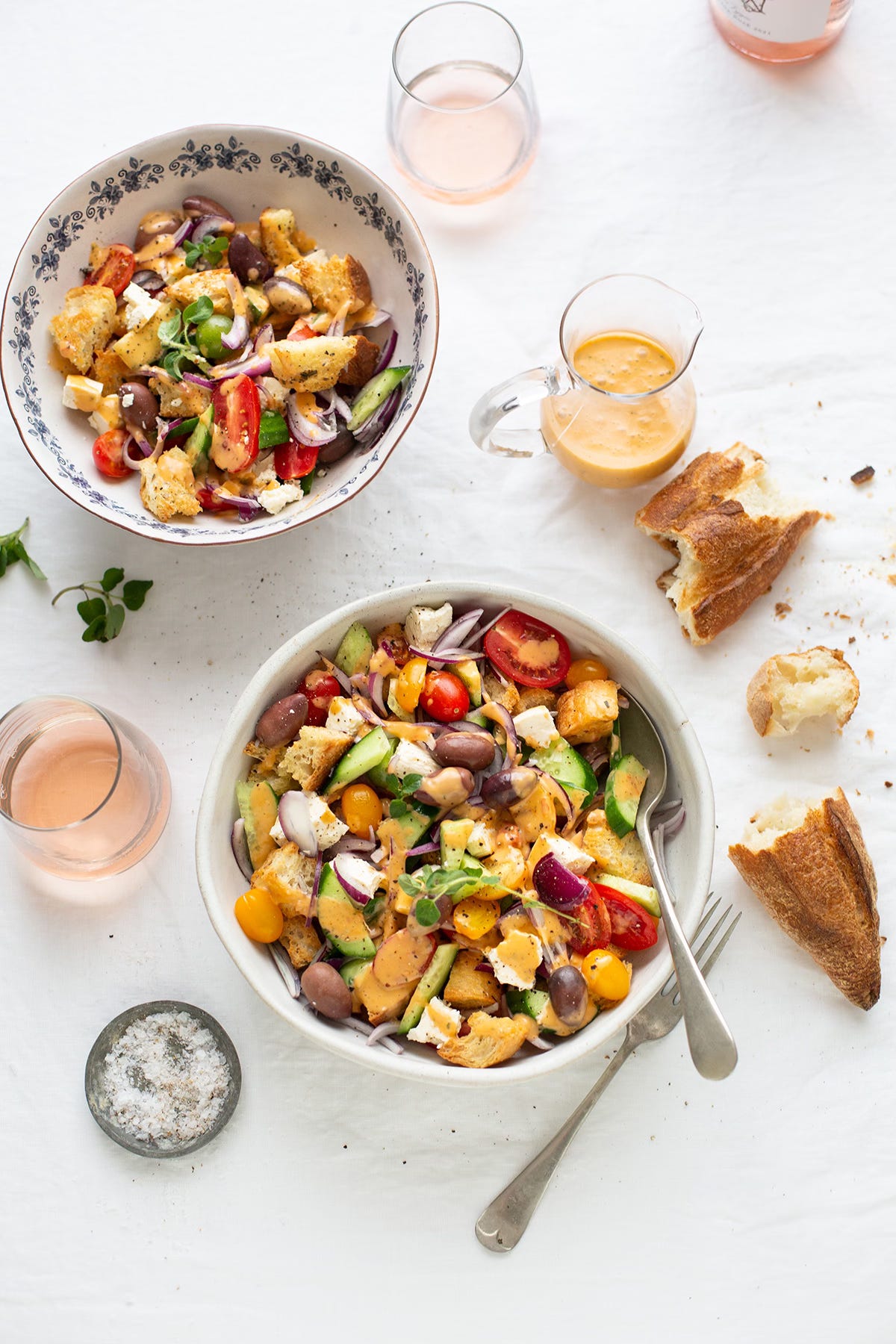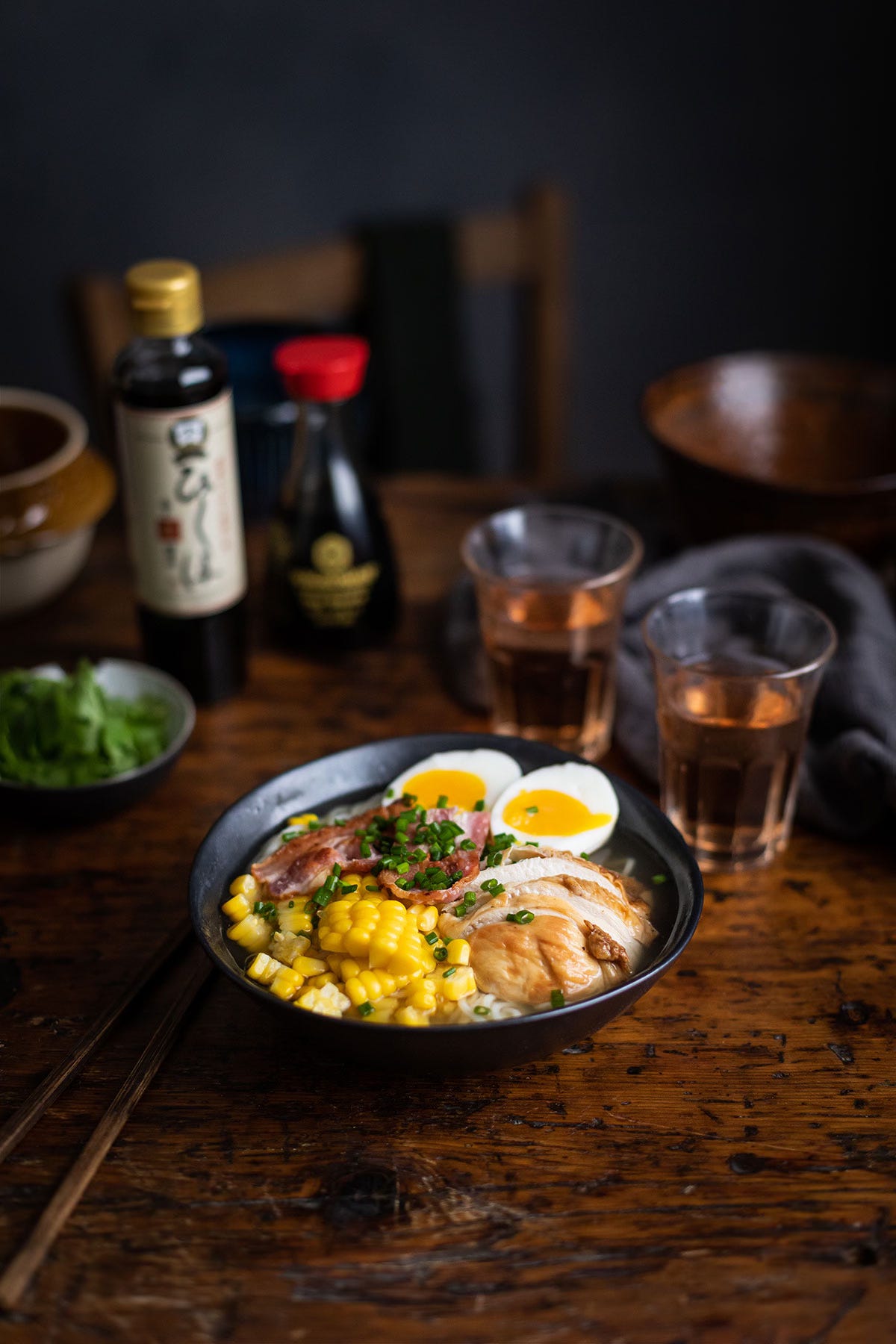Hello friends, and welcome back.
Today, I'm doing a deep dive into vinegar as an ingredient. Since there is quite a lot ot cover, I will do it over two parts (and share a few recipes along the way).
Vinegar is one of the most powerful yet underrated ingredients in the kitchen. Many think of it just as something acidic for salad dressings or pickles, but vinegar does so much more. It enhances flavours, balances richness, tenderises meat and preserves food.
Ten years ago, while watching Swedish chef Magnus Nilsson on either Chef’s Table or Mind of a Chef, I had an aha moment. Before sending the finished dish out to guests, he drizzled just a drop or two of vinegar onto the plate. It made me think differently about the role vinegar plays in balancing or finishing a dish, and I've been using it more creatively in my cooking ever since.
Rice wine vinegar seasons the sushi rice in this salmon poke recipe.
Why Vinegar is Essential in Cooking
At its core, vinegar is an acidic liquid made through fermentation, where bacteria convert alcohol into acetic acid. This acidity gives vinegar its signature tang and makes it a powerful ingredient for:
1. Balancing Flavours
Cooking is all about balance. Sweet, salty, bitter, and umami all work together, and acid plays a crucial role in cutting through richness and brightening flavours.
A drizzle of sherry vinegar in a stew prevents it from tasting heavy. A dash of red wine vinegar in a tomato sauce balances sweetness and rounds out the flavours.
A little vinegar can wake up a dish just like a pinch of salt does.
2. Tenderising Meats
Vinegar breaks down proteins, making it an excellent marinade ingredient for tough cuts of meat. The acid loosens muscle fibres, allowing seasonings to penetrate deeper.
Apple cider vinegar in a pork marinade makes the meat juicy and delicious. White wine vinegar softens chicken while adding subtle brightness.
However, too much vinegar for too long can make meat mushy, so balance is key.
3. Creating Depth & Complexity
Some vinegars, especially aged varieties, have deep, complex flavours that go beyond just acidity.
Balsamic vinegar develops caramelised, fruity notes over time. Black vinegar has a smoky, malty richness that enhances braised dishes, and sherry vinegar has nutty undertones that add depth to sauces and soups.
These vinegars can be used as a finishing touch, much like using a squeeze of lemon or a sprinkle of fresh herbs.
Balsamic can magically enhance the flavour of roasted tomatoes in this whipped feta dish.
4. Preserving & Pickling
Vinegar has been used for centuries as a natural preservative, thanks to its antibacterial properties. It prevents spoilage and adds tangy brightness to foods.
Malt vinegar is used for traditional pickled onions. Rice vinegar is key in making sushi rice and quick-pickled vegetables. Apple cider vinegar is used in health tonics and homemade fermented drinks.
Pickling is one of the easiest ways to extend the life of fresh produce and add intense bursts of flavour to meals.
Pickled mushrooms with herbs & lemon.
5. Enhancing Sauces & Dressings
Vinegar is a key ingredient in vinaigrettes, sauces, and emulsions, where it helps bind ingredients together and adds necessary acidity.
Dijon mustard and red wine vinegar create the base of a classic French vinaigrette. White balsamic vinegar makes a lighter, fruitier salad dressing. and rice vinegar and soy sauce balance Asian dipping sauces and marinades.
A well-made vinaigrette is all about the balance between oil, acid, and seasonings. It doesn’t have to be complicated to transform a plate of vegetables into something so delicious.
Red wine vinegar is added to the dressing for my Greek panzanella. This is one of my all-time favourite salad dressings.
Choosing the Right Vinegar for the Right Dish
With so many vinegars available, knowing when to use each type can make all the difference in cooking.
For Salads & Dressings:
• Balsamic Vinegar – Rich, sweet, and tangy, great for Mediterranean salads.
• Red Wine Vinegar – Classic for Greek and Italian salads.
• White Balsamic Vinegar – Milder than dark balsamic, great for fruit-based dressings.
• Rice Vinegar – Light and slightly sweet, perfect for Asian-inspired salads.
White wine vinegar adds a pop of sweetness to the pickled sultanas in this roast carrot and barley salad.
Pickled sultanas and currants are my latest flavour obsessions, owing a large part to vinegar. I love them in chicken & tuna mayonnaise sandwiches (among many other uses). They develop their flavour over time in the fridge.
For Marinades & Meat Dishes:
• Apple Cider Vinegar – Brightens pork and chicken marinades.
• Sherry Vinegar – Adds complexity to braised meats and roasted vegetables.
• Malt Vinegar – Gives a classic taste to fish and chips.
If your tomatoes aren't at their best, a few drops of red wine or sherry vinegar can easily lift a simple tomato dish, like this pan con tomate.
For Pickling & Preserving:
• White Vinegar – Standard for pickling due to its strong acidity.
• Rice Vinegar – Lighter acidity makes it great for pickled cucumbers and carrots.
• Apple Cider Vinegar – Adds a fruity note to homemade pickles.
Apple cider vinegar is used in this delicious preserved salsa recipe.
For Sauces & Finishing Touches:
• Black Vinegar – Deep, rich flavour for Chinese dipping sauces.
• Sherry Vinegar – Perfect for finishing soups and stews.
• Champagne Vinegar – Delicate enough for light pan sauces.
A drizzle of black vinegar gives my easy ramen with buttered corn, bacon and chicken a lovely wake-up call.
If your dish feels flat or one-dimensional, chances are it needs a touch of acid, and vinegar is the perfect tool for the job. It brings balance, brightness, and complexity, making even simple ingredients taste more vibrant and satisfying.
Experiment with different vinegars in your cooking and notice how each one changes the way flavours interact. Vinegar is a simple yet transformative ingredient that no kitchen should be without.
Next week, I will explore a few of my favourite vinegars in more depth.
A lovely wine dinner event I am going to
I’ll be heading to a special dinner at Merchant Bar & Grill on 6th June, the first of their Taste the Terroir winter series. Each event celebrates a local winemaker or farmer, with a menu built around ingredients from their region.
This one’s with Simelia Wines, a boutique producer from Wellington. I got to experience their amazing wines last year when I stayed at their cottage on the farm.
Expect fynbos-inspired canapés, Simelia MCC, and a bread course with their olives and oil. Starters (fish or vegetarian) will also hero local fynbos.
The main event includes lamb and wild boar from Bontebok Ridge, butchered on-site and served in a variety of cuts and preparations. Then it’s a trio of Foxenburg cheeses with Simelia pairings, and dessert featuring Groenberg honey.
Each dish is individually plated and paired with Simelia wines, and a relaxed, story-rich evening is on the agenda. Owners Simon and Celia will be hosting the event, which will be a goodie. I hope to see you there.
Bookings can be made on Dineplan (vegetarian option available)
Sam x

















Thanks for this deep dive into the types of vinegar… I learned so much, and will be incorporating a lot more little hits of vinegar into my dishes. I have a collection of vinegars, and need to add a couple more - sherry vinegar, white balsamic, and the chinese black vinegar sounds like it would add something amazing to asian dishes. I love the Japanese combo of soy sauce, rice wine vinegar, and sesame oil - so simple a delicious!
I loved your article and learned so much about the different nuances certain vinegars add to a dish. Now to add some of these vinegars to my pantry. Thank-you for sharing your knowledge with us.